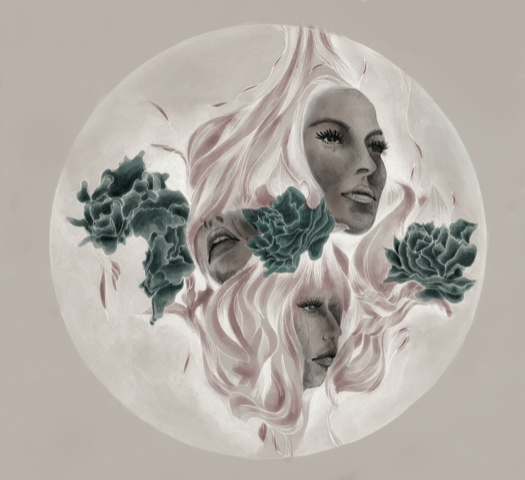A personal struggle with mental illness and masking the pain.
WRITTEN BY CAITLIN HAVENS
ILLUSTRATED BY HELEN CHOI
I was diagnosed with anxiety and depression when I was 13 years old. My mom knew she needed to take me to a doctor when we were in the car on our way to a birthday party. It was only a few turns away from where the party would be held when I said I didn’t want to go anymore.
After she made the U-turn, we argued all the way back home. I cried, and she did too — but not until she was in bed with the covers over her head and the fan blowing on her back. I only knew she was crying because I snuck into her room that night to take ibuprofen. The pounding of my head and the burning of my tears was a pain I wanted to become numb to. So, in my bed and under the covers, I numbed the pain until it came back the next morning.
The doctor’s waiting room smelled like rubber and disinfectant. Each person there was nice to me. Each person there asked how I was doing. Each person was lied to that day. In the examination room, I looked to my feet dangling off the table. The paper crumpled beneath my movements, and the plastic tugged at my sweaty skin. In the corner of the room, Mom sat in a metal chair. She stared at her feet, ignoring my silent pleas. In my head, I imagined telling her nothing was wrong with me and that everything would be OK. That was the day I put my walls up — and it wasn’t to shield myself from the world, but to shield the world from me.
The first time I took my medicine, the blue capsule laid in my hand. “Be quick, or it will melt,” my mom said when I hesitated. It was common — the hesitation — because taking pills was disgusting. Mom crushed them up and put the powder in peanut butter. Those days I felt my lowest — when I wasn’t strong enough to swallow powder.
Eventually, the pills began to create a barrier — a mask. They taught me to cover myself up and to not acknowledge my feelings, but to numb me from them. At that point, I wasn’t even sure they were considered feelings anymore. And when I held the dull blade of a knife to my skin, fear and sadness were distant. I never dug the blade into my skin, but only imagined what it might feel like.
So, I walked the halls of school, said hello to everyone I knew and answered their empty “how are you’s” with even emptier replies. Exclaiming, “I’m good,” down the grimy halls of a public high school was already an indication that I was in fact, lying.
One day in Spanish class, I had a panic attack. “You don’t look good, Caitlin,” said Mrs. Patrillou. “Are you OK?” That’s when she took me out of the room and told me to focus on my breathing. She handed me a plastic cup of water, and I wondered how and when she got it. My aunt, who also worked at the school, stood by my side within minutes. Her hand slung around me, holding me into her body. Here, my mask began to thicken.
At home, I never felt comfortable sharing my feelings. It always resulted in anger from my parents, slamming doors and words screamed by my father. The alcohol on his breath seeped into my skin and reminded me to never speak my mind again.
“You’re being dramatic, don’t be so sensitive, just don’t be sad.”
These were the comments I heard every time I tried to talk to someone. I felt like my feelings weren’t important. Like I wasn’t important. I convinced myself no one cared — that I was dramatic, sensitive and had no right to feel. The only solution was to cover them up. So, my mask gained another layer of thick. It made it easy to forget who I was.
That trait followed me to college. Except I began lying to myself too. The lies weren’t intentional, just habit. But I know they don’t care either.
In the morning, in the mirror and into my eyes, I lie to my face. The reflection is someone I’ve forgotten, a stranger — but seldom is she familiar. My feelings are muted, numbed. Some days, I feel hollow. It’s like you could break through my skin and the muscle, veins and blood would be gone. I’m empty, with nothing to show, tell or even be.
At night, when I lie in bed listening to the silence, staring at the ceiling, it hits me. Everything comes at once — the questioning, the silence, the doubt and everything in-between. The pounding of my head and heart mimic the sound of a ticking clock. When I look over at the face and the hands, an hour will have passed but my mind will be in the same place.
At night, I shower to cleanse myself of the thick layers of lies. In the mirror, I wipe the steam from the glass, revealing a blurry version of myself. More layers peel off, piece-by-piece, falling into the sink and clogging the drain. But I know in the morning, the pores of my skin will be clogged once again and I will lie when I look at my reflection and into my eyes.

